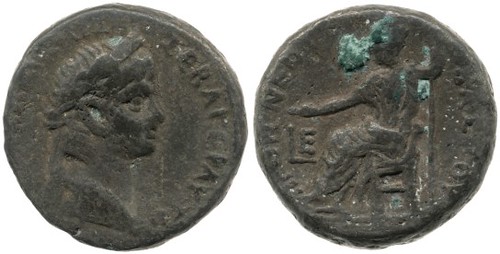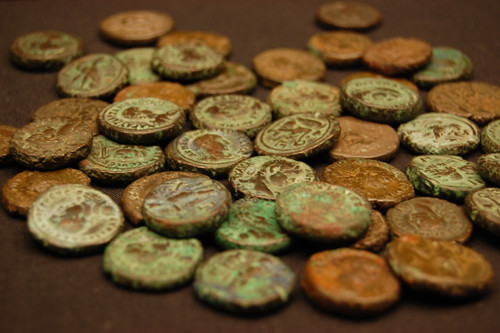
PREV ARTICLE
NEXT ARTICLE
FULL ISSUE
PREV FULL ISSUE
THE MYSTERY OF THE FETTER LANE HOARD
Amelia Dowler, Curator of Greek and Roman Provincial Coins, British Museum, published a blog article this week about a Roman coin hoard
found in London in 1908, and her current research into similar hoards found recently. Here's an excerpt. -Editor
In 1908 workmen excavating foundations for a house in Fetter Lane (City of London) found 46 coins in a pot. The Rev’d FD Ringrose purchased the hoard and published an account in 1911 but focussed on describing the coins rather than the circumstances of the find. By the time the coins were bequeathed to the British Museum in 1914, there was no trace of the pot and no description of it either. There is no full account of exactly how the hoard was found and whilst Roman hoards are often uncovered in Britain (for example the Didcot, Hoxne and Beau Street hoards), the Fetter Lane hoard remains something of a mystery. The Fetter Lane coins were all minted in Alexandria, in Egypt, between AD 58 and AD 284. At this period in the Roman Empire, official coins were produced at centrally controlled mints for use across the empire. However, many other mints also produced civic coins, usually in copper alloys, to be used in the local area. Coins had first been minted in Alexandria under the Ptolemaic dynasty (c.312–30 BC), which continued after Egypt became a Roman province in 30 BC. Unlike in most other provinces, Alexandria was a centrally controlled mint and the coins were initially made of debased silver before declining into a mainly copper alloy coinage. They circulated locally in the eastern Mediterranean and did not form part of the official Roman denomination system. 
The earliest dated coin in the hoard (Year 5: 58/59 AD), depicting Nero. Coins used in the Roman province of Britannia were from official Roman mints and we know this both from coin finds and from references to coins at the time, such as at Vindolanda. Why then would these Alexandrian coins be brought to Britain where they formed no part of the currency system? Over the past 200 years or so when unusual coins like these have been found in Britain they have often been dismissed as modern imports, perhaps brought back to the country as souvenirs from the Grand Tour, or by soldiers returning from service. There is a long history of these finds being dismissed, particularly by coin experts in museums and universities. I am compiling a catalogue of this material to look into this question further: are coins from the Mediterranean world (and sometimes further afield) modern losses or did they arrive in Iron Age or Roman times? These are coins – minted between the 5th century BC up to the end of the 3rd century AD – which would not have been part of a currency system in Britain. This is a particularly relevant question today when the Portable Antiquities Scheme is regularly listing coins with similar origins to the database. The steadily increasing number of ‘foreign’ coins means that it is important to readdress this question rather than dismissing it out of hand. There are examples both of coins being found in known contexts, such as in the Sacred Spring in Bath, and also where we know that coins were modern imports, such as the Alexandrian coins found on the wreck of the HMS Pomone. For the majority of coins however we have no clear information about their findspots. 
The Fetter Lane hoard is currently on display at the British Museum To read the complete article, see:
Wayne Homren, Editor The Numismatic Bibliomania Society is a non-profit organization promoting numismatic literature. See our web site at coinbooks.org. To submit items for publication in The E-Sylum, write to the Editor at this address: whomren@gmail.com To subscribe go to: https://my.binhost.com/lists/listinfo/esylum All Rights Reserved. NBS Home Page Contact the NBS webmaster 
|